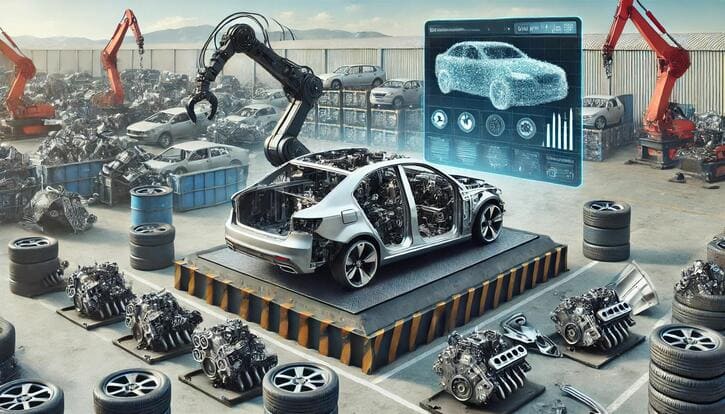Car recycling has come a long way. It’s no longer just about stripping a vehicle for parts and scrapping the rest. These days, the process is far more sophisticated, thanks to the role of technology. You might be surprised by just how much of a car can be reused or recycled now, all because of technological advances. In this blog, we’ll explore how technology has transformed car recycling, why it’s essential, and what it means for the future.
The Shift Towards Sustainability
The automotive industry is often seen as a key contributor to pollution, but it’s also becoming a leader in sustainability, and car recycling is at the heart of this shift. Governments and companies are realising that recycling vehicles can help reduce environmental damage. In fact, car recycling plays a massive part in reducing waste and lowering the need for new raw materials. This means fewer resources are taken from the Earth, and less energy is used to make new products.
But how does technology fit into all this? Well, it’s the driving force behind making the recycling process more efficient, environmentally friendly, and safe. And with millions of cars reaching the end of their lives each year, it’s a crucial part of building a greener future.
Automation in Dismantling
One of the most obvious ways technology has changed car recycling is through automation. In the past, recycling a car was a labour-intensive task, requiring workers to manually dismantle vehicles and separate different materials. It was slow, and not always effective. Now, automation is streamlining this process.
Robotic arms and advanced machinery can disassemble vehicles much faster than humans, with less margin for error. They can strip down a car, separating its parts with incredible precision. By identifying and sorting materials like aluminium, steel, and plastic, robots help recyclers recover more valuable resources.
You’ll find that this not only saves time but also boosts the amount of material that can be recycled. In turn, this reduces the need for raw materials, which lowers costs and lessens environmental harm. Automation is truly a game-changer for efficiency and sustainability in car recycling.
Advanced Sorting and Material Recovery
When a car is recycled, it’s not just about stripping it down and using its parts. Every vehicle contains a mixture of materials, some of which are more valuable or easier to recycle than others. The challenge is in identifying these materials quickly and accurately, especially in modern vehicles with complex designs.
This is where advanced sorting technologies come in. Using methods such as magnetic separation, eddy current separation, and infrared sensors, recyclers can identify and separate metals, plastics, and other materials. These technologies work at a level of precision that would have been unimaginable just a few years ago.
For example, magnetic separation is used to pull out ferrous metals (like steel), while eddy current separation is effective for non-ferrous metals, such as aluminium. Infrared sensors, on the other hand, can detect the type of plastic used in a car’s components. This ensures that each material is sent to the right recycling stream, making the process more efficient and reducing waste.
By improving material recovery, technology not only makes recycling more profitable but also reduces the need to mine and produce new materials, which is a huge win for the environment.
The Rise of Electric Vehicles and Battery Recycling
Electric vehicles (EVs) are becoming more common on our roads, and while they’re better for the environment in terms of emissions, they present new challenges when it comes to recycling. The biggest of these challenges is the battery.
Electric car batteries are made from materials like lithium, cobalt, and nickel, which are not only valuable but also hard to extract and recycle. Left untreated, these batteries can cause significant environmental harm. Thankfully, technology is stepping up to tackle this issue.
New methods of recycling EV batteries are being developed, including processes that allow for the extraction and reuse of precious metals. In some cases, it’s even possible to refurbish old batteries for reuse in other applications, like energy storage for homes. Advanced technology makes it easier to break down batteries safely, extract these valuable materials, and ensure they don’t end up in landfills.
As EVs become more widespread, battery recycling is set to play an increasingly important role in the automotive recycling industry. The development of more efficient and sustainable battery recycling methods will be essential for making the shift to electric cars as green as possible.
Digital Tracking and Traceability
Another way technology is making a difference in car recycling is through digital tracking systems. With millions of cars being recycled each year, keeping track of parts, materials, and their destinations can be a logistical nightmare. Digital tracking is solving this problem.
Many recycling centres now use computer systems to track a car throughout the recycling process. These systems can record where parts are sent, what materials are recovered, and how they are reused. This not only improves efficiency but also ensures transparency, allowing businesses to prove their commitment to sustainability.
You might have heard of the concept of a “circular economy,” where products are designed to be reused and recycled over and over. Digital tracking plays a vital role in this. By knowing exactly where every component ends up, recyclers can ensure that materials are reused in the best possible way, reducing the need for new resources and keeping waste out of landfills.
Data-Driven Decisions
Car recycling is also benefiting from big data. Using data analytics, recyclers can make more informed decisions about which vehicles to target, which materials to focus on, and how to optimise the recycling process.
For example, by analysing data on the types of cars being scrapped, recyclers can predict which materials will be most in demand and adjust their processes accordingly. This kind of insight helps recyclers plan more effectively and make sure they’re always maximising the value they get from each car.
Data also helps to improve safety. By using information on how cars are built and where hazardous materials are located, recyclers can avoid risks, protect workers, and comply with environmental regulations. It’s a smart way to make recycling safer, faster, and more efficient.
The Future of Car Recycling
As technology continues to evolve, so will car recycling. The next big thing? You might see artificial intelligence (AI) playing a bigger role. With AI, recyclers could predict demand for certain materials more accurately, identify new recycling methods, and even create smarter machines for disassembling cars.
There’s also the potential for 3D printing to revolutionise the way we think about recycling. Imagine being able to recycle old car parts and use the raw materials to 3D print new components. This could significantly reduce waste and cut down on the need for producing new materials altogether.
In the future, we may also see even more integration between different industries, creating a fully circular economy. Cars of the future might be designed specifically with recycling in mind, making it easier to reuse materials and components at the end of a vehicle’s life.
Why It Matters
So, why is all this important? At its core, car recycling is about sustainability. The more efficient we can make the process, the less impact we’ll have on the environment. With the world facing challenges like climate change and resource depletion, finding ways to reduce waste and reuse materials has never been more critical.
Technology is making it possible to recycle cars more effectively, recover more valuable resources, and reduce the environmental harm caused by the automotive industry. And as electric vehicles become the norm, these advances will only become more important.
By embracing these new technologies, the car recycling industry is helping to create a cleaner, greener future. It’s about turning old cars into new opportunities, and with the pace of technological change, the future looks bright.
Final Words
Car recycling is no longer just about scrapping old vehicles. It’s a high-tech, sustainable industry that’s playing a vital role in protecting our planet. Through automation, advanced sorting, battery recycling, digital tracking, and data-driven decisions, technology is transforming the way we recycle cars. And with the rise of electric vehicles and new developments on the horizon, it’s clear that technology will continue to shape the future of car recycling for years to come.
In the end, this all leads to a more sustainable world—one where cars can be reused, recycled, and repurposed with minimal waste. That’s something worth getting excited about!

